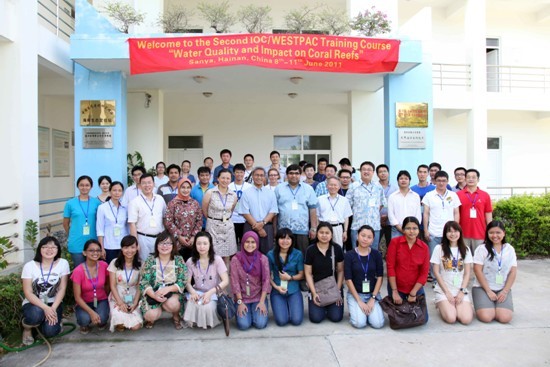The 2nd IOC/WESTPAC Training Course: “Water Quality and Impact on Coral Reefs” was successfully conclusion in Sanya, Hainan, China
The 2nd IOC/WESTPAC Training Course: “Water Quality and Impact on Coral Reefs” was held during the 8th – 11th June 2011 in Sanya, Hainan, China. It was sponsored by IOC/WESTPAC-CorReCAP and organized by Profs. Hui Huang from South China Sea Institute of Oceanology, CAS and Jing Zhang from East China Normal University. This training course was also supported by The State Oceanic Administration of China, The Chinese Academy of Sciences (CAS) and The Chinese National Science Foundation. On behalf of the host institute, Prof. Gordon Xie, the assistant director of The South China Sea Institute of Oceanology, CAS delivered the opening speech. Five invited lectures were made by experts from Philippines, Thailand, Korea and China on the following topics: non-point source pollution of coral reef environment; changes in water environments on coral reefs; heavy metal and acidification recorded in coral skeleton; marine pollution and biogeochemistry and water quality on biology and ecology of coral reefs. The total number of trainee was 32, including 14 fully funded students. The trainees, 16 of them were non-Chinese, were from 10 districts or countries: The Philippines, Malaysia, Indonesia, Thailand, Vietnam, Korea, India, Singapore, Hong Kong and Mainland China. The training course was divided into 3 parts: lectures from experts; field and lab investigation; oral presentations and/or posters by trainees.
Through the 2nd IOC/WESTPAC Training Course, students had investigated the effect of water quality on coral reefs and the status of reefs in Sanya with strong human disturbance. Students learned some basic skills on reef survey and measurements of water qualityparameters. The training course provided an opportunity and a basis for cooperative studies and exchanging information in west pacific region.
Coral reef, so called “tropical rain forest in the ocean”, was one of ecosystem with most diversity. It has important ecological function and provides resources (e.g. fishery, marine medicine and eco-tourism, etc.) for human-beings. However, coral reef ecosystem was one of the most sensitive and fragile ecosystem. Coastal coral reefs were in decline as a result of intensified human activity and increasing terrigenous inputs in recent decades. So, worsening seawater quality has become one of the most important limiting factors for coast reef development.
The “Coral Reefs under Climate and Anthropogenic Perturbations” Project (IOC/WESTPAC-CorReCAP) was established at the 7th IOC/WESTPAC Intergovernmental Session (Sabah/Malaysia, 26-29 May 2008), to safeguard the health of coral reef ecosystems, and carry out cost-effective management procedures and policies to maintain the sustainability of coral reefs, with a well-coordinated network within the Western Pacific Region. The 1st IOC/WESTPAC Training Course “Impact of Sedimentary Dynamics and Biogeochemistry on Coral Reefs” was held in Koh Samui, Thailand, 15th – 18th June 2010.
